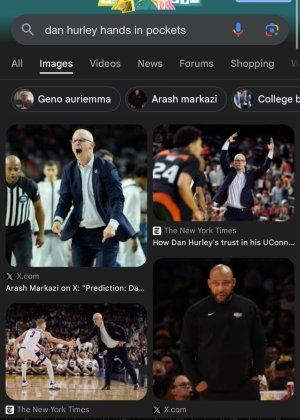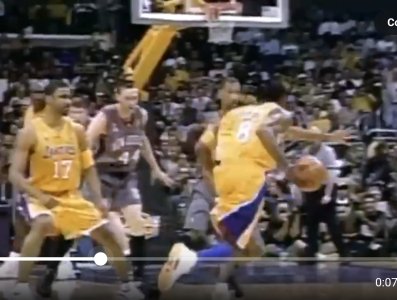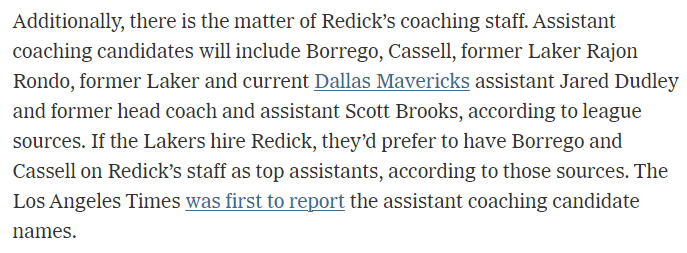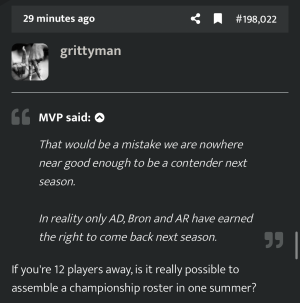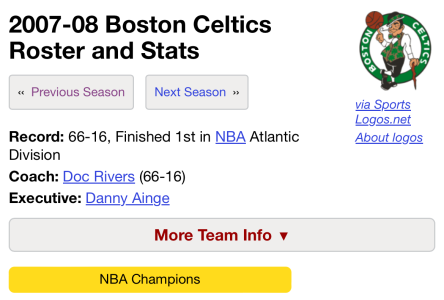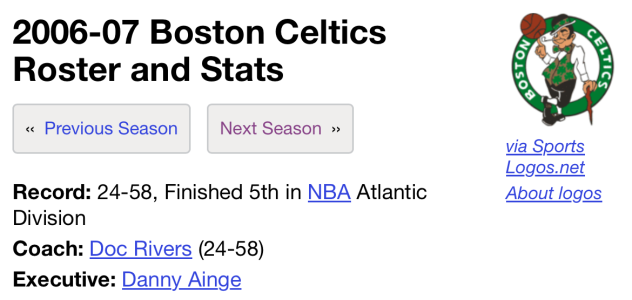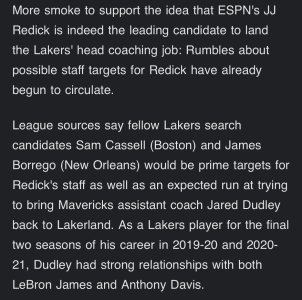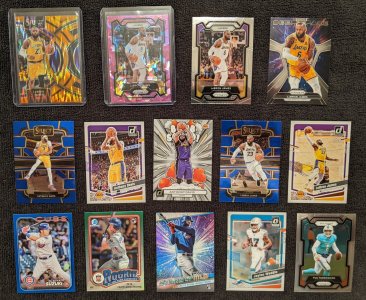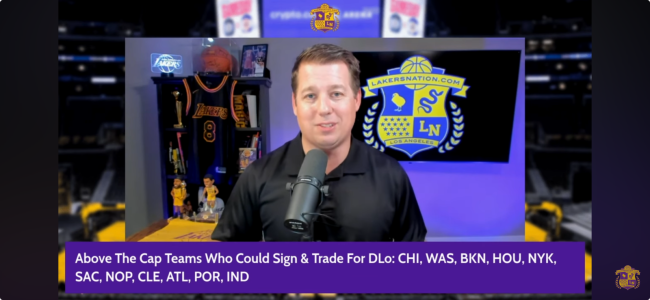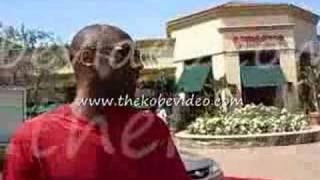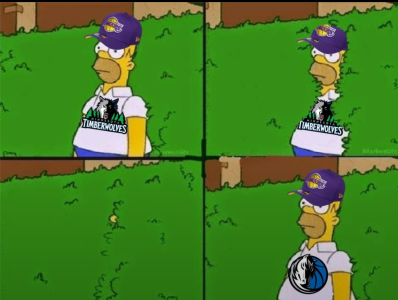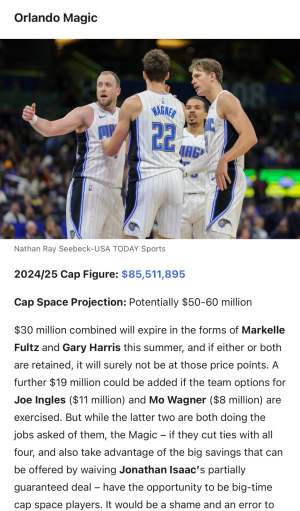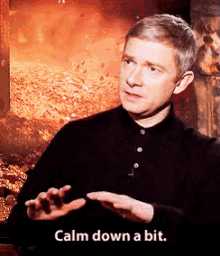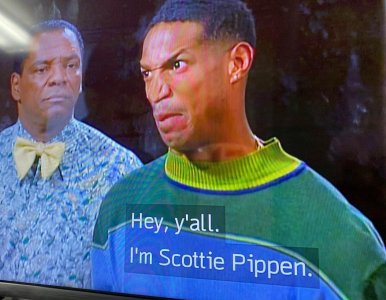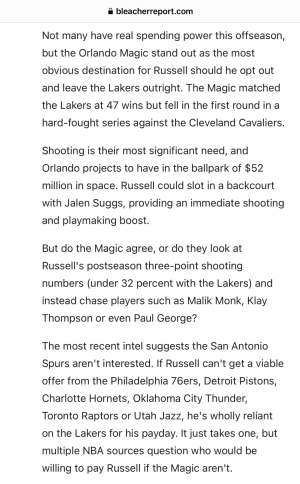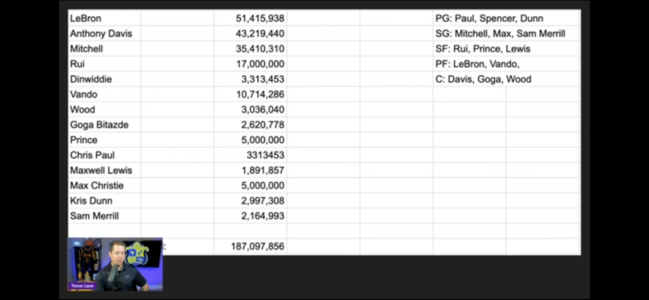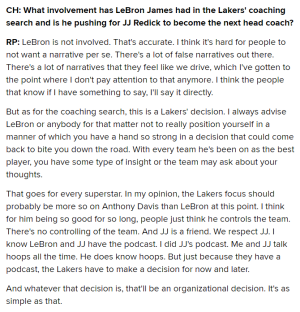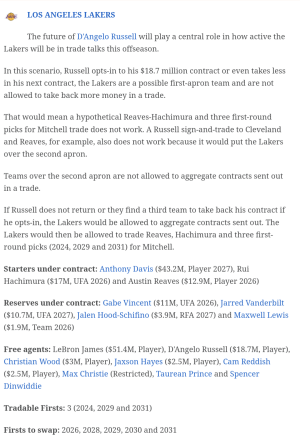- 87,568
- 115,800
- Joined
- Sep 5, 2010
LeBron James wants to win more championships. Could that lead him to turn down a Lakers extension?
This is starting to feel like a marriage of convenience.
LeBron James knows there’s only one place where he can get paid max money to play alongside Anthony Davis while maybe — just maybe — finding a way to contend for a title again. He knows the all-time scoring record is in reach next season, and the notion of breaking Kareem Abdul-Jabbar’s hallowed mark while wearing the purple and gold would be the stuff of Lakers storybooks. Add in the powerful combination of the Lakers and the Los Angeles scene, how living in that part of the world and playing for that storied franchise comes with a long list of benefits for both his off-court business and his family, and one could make a strong argument there’s nowhere else he should want to go.
Dysfunction be damned.
Yet in the wake of the messy Frank Vogel firing that dominated the Lakers’ exit interviews with the media on Monday, James left one key question unanswered during his 25-minute session with reporters: How long might this imperfect basketball union last?
When James was asked about his plans for this August, when he’s eligible for a two-year extension worth $97.1 million that would secure his services through the summer of 2025, it came as a surprise to hear him hedge on his Lakers future even the slightest bit. Even with the stir James created at the All-Star break, when he left the masses wondering if he might want a trade this summer, the late-February meeting between his agent Rich Paul, Lakers owner Jeanie Buss and president of basketball operations Rob Pelinka had left everyone talking about a long-term partnership again. And now … this.
“The conversation hasn’t been talked about,” James began. “Technically it’s because (with) the collective bargaining agreement (it) cannot even be discussed until later on in the year. So, you know, I know what’s out there. But we can’t even — myself and Rich — can’t even begin to talk with Rob, or the front office at all, because of the collective bargaining agreement. So (when) we get to that point, we’ll see.”
We’ll see? If that doesn’t show you James is still reading the Lakers room right now, then nothing else will. Then again, can anyone blame him for continuing to reassess a situation that looks as sideways now as it did when Magic Johnson walked off the Staples Center set back on April 10 of 2019?
Consider this much: By the time James addressed reporters, nearly 12 hours had passed since ESPN reported that Vogel would be fired and put the coach in the uncomfortable position of addressing the matter in his postgame news conference.
“I haven’t been told ****,” Vogel had famously said.
Yet still, despite the fact that the Lakers sent media members an email about the timing of James’ interview just 32 minutes after the Vogel report, sources say the team still hadn’t formally told Vogel of his fate by the time James was asked to address it. The Lakers finally announced the decision at 10:58 a.m., by way of a 160-word release. Rest assured, it was not just the reporters accusing them of (very avoidable) disrespect toward a man who had led the franchise to its 17th title less than 18 months before.
“Well, I mean, I only can control what I could control, Sam,” James said when I asked (via Zoom) if he had any issues with the way the organization had handled Vogel’s exit. “And at the end of the day, I knew what time I was coming to speak to y’all. So I woke up extra early, got my daughter ready for school, dropped her off at school, and I came down here to see y’all.
“And I was here at 8:45 and ready to start. It would have been at 9:00 on the dot, but (his longtime media adviser) Adam Mendelsohn kept me for a couple more minutes than I needed to be kept for, so I was in here at 9:03. So I apologize for those three minutes. But I can only control what I can control, Sam, and you can’t worry about, you know, what’s going on outside and how people feel and things of that nature, you know? So there’s a lot of things that could be done a certain way, can be done better this way or that way. But when decisions (are) made, you’re never going to, you know, never gonna make everybody happy. So that’s just the way it is.”
He may as well have said, “I just work here.”
Make no mistake, the messiness matters — to James and every other Lakers employee who simply wishes they’d do better. But James most of all.
Any athlete of James’ stature, and at this late stage of his career, wants the organization for which he excels to win on the margins. And this sort of managerial style, it’s safe to say, isn’t the kind of thing that inspires confidence. As if the power dynamics already in play in Laker Land weren’t proving to be tricky enough in these past few months.
As James himself so subtly highlighted, the key element here — control — is one that will continue to be front and center as this imperfect pairing continues. It’s not as if James lacks influence in his work life. Far from it. After all, he was the driving force behind the Russell Westbrook trade that played a massive part in derailing the Lakers’ season. But there have been plenty of times in his Lakers experience when he didn’t get his way too.
If James truly had the deciding vote, Ty Lue would have been hired as head coach in the summer of 2019 rather than Vogel. Ditto for Jason Kidd, who was Vogel’s lead assistant with the Lakers the past two seasons before heading to Dallas last summer.
And here’s a tidbit to monitor as the Lakers conduct their latest coaching search: Sources say James would be very enthused by the prospect of Mark Jackson landing the job. But as history tells us, that doesn’t mean it will actually happen.
Yet while James has shown a willingness to yield when his viewpoint isn’t deemed the difference-maker, that doesn’t mean there aren’t concerns that have been compartmentalized all along the way. At the age of 37, and on the heels of a season in which he played at an MVP-caliber level while leading a team that somehow managed to go nowhere, he’s well aware this Lakers franchise has the kind of foundational faults that were exposed all over again this season.
He knows the team would be better off by bolstering the basketball operations infrastructure, changing the well-deserved narrative that they’re run like a “mom-and-pop shop” by adding experienced executives to work alongside president of basketball operations Pelinka (who continues to have Jeanie’s support) and his right-hand man, Kurt Rambis (who is also expected to remain as a divisive and extremely influential presence). This is a Lakers front office that inspires a deep distrust and frustration in many of its rival front-office executives and agents — a reality that doesn’t bode well for roster improvement in this desperate time. Still, the reluctance remains to address these problems that are common knowledge around the league.
James surely knows the Lakers should improve the scouting and analytics departments too, investing in the kind of bright basketball minds who could create a competitive edge during these later years of his storied career. A first step, many would argue, would be to create and support the kind of inclusive and collaborative culture where solutions tend to rise to the surface.
James and his associates aren’t blind to any of this.
So with all that in mind, what comes next in James’ Lakers life?
Based on my conversations with people who have a strong sense of such things, it’s clear James is considering playing out this contract rather than signing a two-year extension this summer. If flexibility and freedom are the goals here, James (who is owed $44.4 million next season) could go back to the year-by-year approach he perfected in his second Cleveland stop.
As he has made abundantly clear of late, he’ll do everything he can to play with his son, Bronny Jr., when and if he makes the jump to the NBA (in the summer of 2024, at the earliest). Signing one-year deals is a surefire way to avoid any contractual obstacles to that dream scenario. And if he has to take less than max money at some point to make it happen, then so be it.
First things first, though, there’s the Westbrook quandary that simply must be solved (assuming he exercises the $47 million player option on his deal). As our Shams Charania reported Monday, Indiana is seen as a possible trade partner. Charlotte is widely considered another.
Yet despite James’ well-chronicled endorsement of the L.A. Rams’ “**** them picks” approach, the Lakers’ asset cabinet is already too bare to be reckless with their first-rounders in 2027 and 2029. As our John Hollinger laid out so well here, it’s a rock-and-a-hard-place dilemma if ever there was one. But if Westbrook remains, there will be significant pressure for him to take on the sixth-man role that some key Lakers figures believe he should have embraced this season.
For James’ part, he offered a reminder on Monday that shouldn’t be overlooked: He’s not in Laker Land merely to sell tickets. The pursuit of another championship — a fifth for him and an 18th for a Lakers organization that so badly wants to break its tie with the rival Celtics — remains a major priority.
No matter where he plays.
“I came here to win a championship; I want to win more,” James said matter of factly. “So I accomplished what I wanted to accomplish, but I’m still hungry for more. … I’m confident that this organization wants the same. It’s what this organization has always been about.”
“What they’ve done (with) decade and decade and decade and decades of winning. But yeah, when I signed here, you know, when Magic was here and you know, Rob was here obviously — Rob’s still here. I told him that I want to … help this franchise become a champion once again. So I’ve done that. We’ve done that. But I want to do it again.”
This is starting to feel like a marriage of convenience.
LeBron James knows there’s only one place where he can get paid max money to play alongside Anthony Davis while maybe — just maybe — finding a way to contend for a title again. He knows the all-time scoring record is in reach next season, and the notion of breaking Kareem Abdul-Jabbar’s hallowed mark while wearing the purple and gold would be the stuff of Lakers storybooks. Add in the powerful combination of the Lakers and the Los Angeles scene, how living in that part of the world and playing for that storied franchise comes with a long list of benefits for both his off-court business and his family, and one could make a strong argument there’s nowhere else he should want to go.
Dysfunction be damned.
Yet in the wake of the messy Frank Vogel firing that dominated the Lakers’ exit interviews with the media on Monday, James left one key question unanswered during his 25-minute session with reporters: How long might this imperfect basketball union last?
When James was asked about his plans for this August, when he’s eligible for a two-year extension worth $97.1 million that would secure his services through the summer of 2025, it came as a surprise to hear him hedge on his Lakers future even the slightest bit. Even with the stir James created at the All-Star break, when he left the masses wondering if he might want a trade this summer, the late-February meeting between his agent Rich Paul, Lakers owner Jeanie Buss and president of basketball operations Rob Pelinka had left everyone talking about a long-term partnership again. And now … this.
“The conversation hasn’t been talked about,” James began. “Technically it’s because (with) the collective bargaining agreement (it) cannot even be discussed until later on in the year. So, you know, I know what’s out there. But we can’t even — myself and Rich — can’t even begin to talk with Rob, or the front office at all, because of the collective bargaining agreement. So (when) we get to that point, we’ll see.”
We’ll see? If that doesn’t show you James is still reading the Lakers room right now, then nothing else will. Then again, can anyone blame him for continuing to reassess a situation that looks as sideways now as it did when Magic Johnson walked off the Staples Center set back on April 10 of 2019?
Consider this much: By the time James addressed reporters, nearly 12 hours had passed since ESPN reported that Vogel would be fired and put the coach in the uncomfortable position of addressing the matter in his postgame news conference.
“I haven’t been told ****,” Vogel had famously said.
Yet still, despite the fact that the Lakers sent media members an email about the timing of James’ interview just 32 minutes after the Vogel report, sources say the team still hadn’t formally told Vogel of his fate by the time James was asked to address it. The Lakers finally announced the decision at 10:58 a.m., by way of a 160-word release. Rest assured, it was not just the reporters accusing them of (very avoidable) disrespect toward a man who had led the franchise to its 17th title less than 18 months before.
“Well, I mean, I only can control what I could control, Sam,” James said when I asked (via Zoom) if he had any issues with the way the organization had handled Vogel’s exit. “And at the end of the day, I knew what time I was coming to speak to y’all. So I woke up extra early, got my daughter ready for school, dropped her off at school, and I came down here to see y’all.
“And I was here at 8:45 and ready to start. It would have been at 9:00 on the dot, but (his longtime media adviser) Adam Mendelsohn kept me for a couple more minutes than I needed to be kept for, so I was in here at 9:03. So I apologize for those three minutes. But I can only control what I can control, Sam, and you can’t worry about, you know, what’s going on outside and how people feel and things of that nature, you know? So there’s a lot of things that could be done a certain way, can be done better this way or that way. But when decisions (are) made, you’re never going to, you know, never gonna make everybody happy. So that’s just the way it is.”
He may as well have said, “I just work here.”
Make no mistake, the messiness matters — to James and every other Lakers employee who simply wishes they’d do better. But James most of all.
Any athlete of James’ stature, and at this late stage of his career, wants the organization for which he excels to win on the margins. And this sort of managerial style, it’s safe to say, isn’t the kind of thing that inspires confidence. As if the power dynamics already in play in Laker Land weren’t proving to be tricky enough in these past few months.
As James himself so subtly highlighted, the key element here — control — is one that will continue to be front and center as this imperfect pairing continues. It’s not as if James lacks influence in his work life. Far from it. After all, he was the driving force behind the Russell Westbrook trade that played a massive part in derailing the Lakers’ season. But there have been plenty of times in his Lakers experience when he didn’t get his way too.
If James truly had the deciding vote, Ty Lue would have been hired as head coach in the summer of 2019 rather than Vogel. Ditto for Jason Kidd, who was Vogel’s lead assistant with the Lakers the past two seasons before heading to Dallas last summer.
And here’s a tidbit to monitor as the Lakers conduct their latest coaching search: Sources say James would be very enthused by the prospect of Mark Jackson landing the job. But as history tells us, that doesn’t mean it will actually happen.
Yet while James has shown a willingness to yield when his viewpoint isn’t deemed the difference-maker, that doesn’t mean there aren’t concerns that have been compartmentalized all along the way. At the age of 37, and on the heels of a season in which he played at an MVP-caliber level while leading a team that somehow managed to go nowhere, he’s well aware this Lakers franchise has the kind of foundational faults that were exposed all over again this season.
He knows the team would be better off by bolstering the basketball operations infrastructure, changing the well-deserved narrative that they’re run like a “mom-and-pop shop” by adding experienced executives to work alongside president of basketball operations Pelinka (who continues to have Jeanie’s support) and his right-hand man, Kurt Rambis (who is also expected to remain as a divisive and extremely influential presence). This is a Lakers front office that inspires a deep distrust and frustration in many of its rival front-office executives and agents — a reality that doesn’t bode well for roster improvement in this desperate time. Still, the reluctance remains to address these problems that are common knowledge around the league.
James surely knows the Lakers should improve the scouting and analytics departments too, investing in the kind of bright basketball minds who could create a competitive edge during these later years of his storied career. A first step, many would argue, would be to create and support the kind of inclusive and collaborative culture where solutions tend to rise to the surface.
James and his associates aren’t blind to any of this.
So with all that in mind, what comes next in James’ Lakers life?
Based on my conversations with people who have a strong sense of such things, it’s clear James is considering playing out this contract rather than signing a two-year extension this summer. If flexibility and freedom are the goals here, James (who is owed $44.4 million next season) could go back to the year-by-year approach he perfected in his second Cleveland stop.
As he has made abundantly clear of late, he’ll do everything he can to play with his son, Bronny Jr., when and if he makes the jump to the NBA (in the summer of 2024, at the earliest). Signing one-year deals is a surefire way to avoid any contractual obstacles to that dream scenario. And if he has to take less than max money at some point to make it happen, then so be it.
First things first, though, there’s the Westbrook quandary that simply must be solved (assuming he exercises the $47 million player option on his deal). As our Shams Charania reported Monday, Indiana is seen as a possible trade partner. Charlotte is widely considered another.
Yet despite James’ well-chronicled endorsement of the L.A. Rams’ “**** them picks” approach, the Lakers’ asset cabinet is already too bare to be reckless with their first-rounders in 2027 and 2029. As our John Hollinger laid out so well here, it’s a rock-and-a-hard-place dilemma if ever there was one. But if Westbrook remains, there will be significant pressure for him to take on the sixth-man role that some key Lakers figures believe he should have embraced this season.
For James’ part, he offered a reminder on Monday that shouldn’t be overlooked: He’s not in Laker Land merely to sell tickets. The pursuit of another championship — a fifth for him and an 18th for a Lakers organization that so badly wants to break its tie with the rival Celtics — remains a major priority.
No matter where he plays.
“I came here to win a championship; I want to win more,” James said matter of factly. “So I accomplished what I wanted to accomplish, but I’m still hungry for more. … I’m confident that this organization wants the same. It’s what this organization has always been about.”
“What they’ve done (with) decade and decade and decade and decades of winning. But yeah, when I signed here, you know, when Magic was here and you know, Rob was here obviously — Rob’s still here. I told him that I want to … help this franchise become a champion once again. So I’ve done that. We’ve done that. But I want to do it again.”



